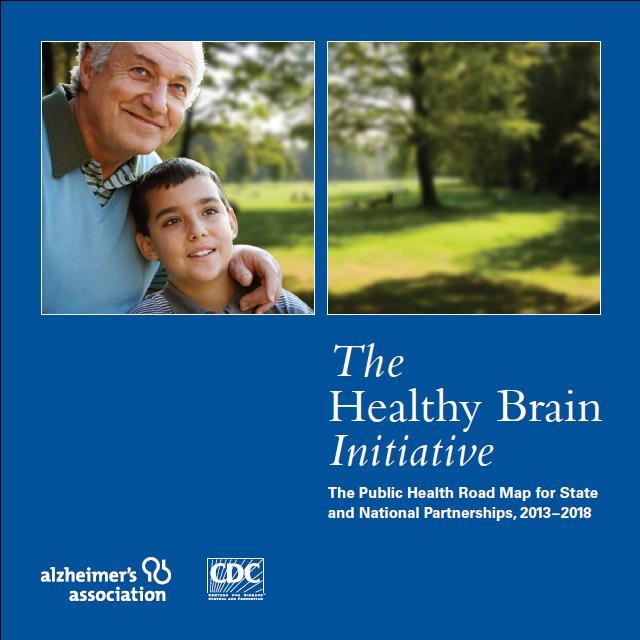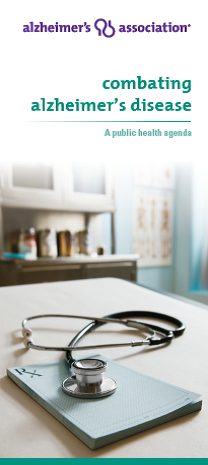End-of-Life Care for Dementia Much More Costly than for Other Diseases
 Health care, long-term care, and caregiving costs during the final five years of life for people with dementia are 57 percent higher than for those without dementia, according to a new study in the Annals of Internal Medicine. On average, the final five years of life for a person with dementia cost more than $287,000, compared with $183,000 for those without. Health care, long-term care, and caregiving costs during the final five years of life for people with dementia are 57 percent higher than for those without dementia, according to a new study in the Annals of Internal Medicine. On average, the final five years of life for a person with dementia cost more than $287,000, compared with $183,000 for those without.
Because a large portion of these costs are for long-term care, which is not covered by Medicare, the burden is particularly hard on families and state Medicaid budgets. The study found out-of-pocket spending by people with dementia is 81 percent higher compared with people without dementia, and these costs represent, on average, nearly one third of a family’s total wealth. African Americans spend, on average, over 83 percent of their wealth caring for a person with dementia in the last five years of life.
Medicaid costs in the last five years of life are nearly 700 percent higher for people with dementia than for people without dementia. And, a recent report from the Alzheimer’s Association projects that Medicaid spending on people with dementia will increase in all states over the next ten years, with 35 states seeing increases in Medicaid costs of at least 40 percent. (The Kaiser Family Foundation’s recent issue brief, Medicaid’s Role for People with Dementia, is a good primer on access to Medicaid coverage for people with dementia, service utilization, costs, and related policy issues.)
Three Briefs Encourage Road Map Action Item Implementation
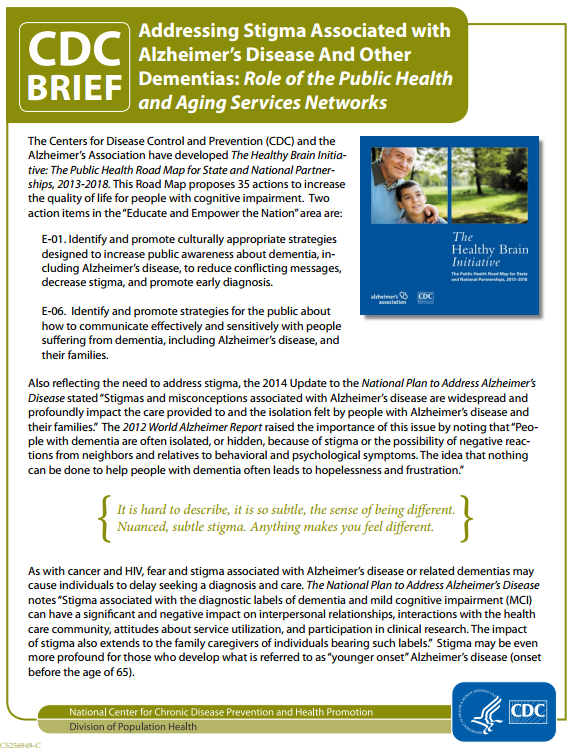 Three new briefs from the Healthy Aging Program of the Centers for Disease Control and Prevention (CDC) outline ways public health officials can implement specific action items of the Public Health Road Map. The briefs highlight the critical role the public health community can play in increasing the quality of life for people with cognitive impairment. They provide state-specific examples of successful implementation efforts and include resources that can be used by public health officials. The three briefs are: Three new briefs from the Healthy Aging Program of the Centers for Disease Control and Prevention (CDC) outline ways public health officials can implement specific action items of the Public Health Road Map. The briefs highlight the critical role the public health community can play in increasing the quality of life for people with cognitive impairment. They provide state-specific examples of successful implementation efforts and include resources that can be used by public health officials. The three briefs are:
• Emergency Preparedness Needs of Individuals Living with Cognitive Impairment and Their Care Partners – ensuring the unique needs of adults with dementia are addressed in state and local disaster planning (Road Map action item P-02).
• Financial Exploitation Among People Living with Cognitive Impairment and Their Care Partners – ensuring people with cognitive difficulties do not become victims of financial abuse and exploitation (Road Map action item E-10).
• Stigma Associated with Alzheimer’s Disease and Other Dementias – decreasing the negative impact of cognitive impairment diagnoses on interpersonal relationships and interactions with the health care community (Road Map action item E-01).
Early Detection and Diagnosis Webinar Now Available Online
 In case you missed The Value of Knowing: The Importance of Early Detection, last month’s webinar from the Alzheimer’s Association, you can now watch it online. The webinar discusses why detection of Alzheimer’s disease and the disclosure of a diagnosis to individuals are important, the need for the public health community to promote early detection and diagnosis disclosure, and what public health departments around the nation are doing. In case you missed The Value of Knowing: The Importance of Early Detection, last month’s webinar from the Alzheimer’s Association, you can now watch it online. The webinar discusses why detection of Alzheimer’s disease and the disclosure of a diagnosis to individuals are important, the need for the public health community to promote early detection and diagnosis disclosure, and what public health departments around the nation are doing.
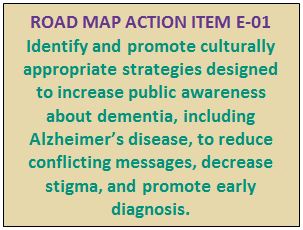 In addition to the webinar, new resources from the Alzheimer’s Association are available to help public health officials encourage early detection. In addition to the webinar, new resources from the Alzheimer’s Association are available to help public health officials encourage early detection.
• A policy brief discusses the benefits and barriers to early detection and outlines possible policy actions.
• A one-page “Spotlight” provides a quick general overview of the importance of early detection and highlights some specific actions public health practitioners can implement in their communities.
For further information, guidance, and/or technical assistance on increasing early detection and promoting disclosure of a diagnosis – or any Public Health Road Map action item – complete this form or contact Molly French at mfrench@alz.org or (202) 638-8674.
The Alzheimer’s Public Health E-News is supported by Cooperative Agreement #NU58DP006115-01 from the Centers for Disease Control and Prevention
(CDC). Its contents are solely the responsibility of the Alzheimer’s
Association and do not necessarily represent the official views of the CDC.
For subscription services or to view previous issues of Alzheimer’s Public Health News, please visit http://alz.org/publichealth/public-health-news.asp or contact John Shean (jshean@alz.org).
|
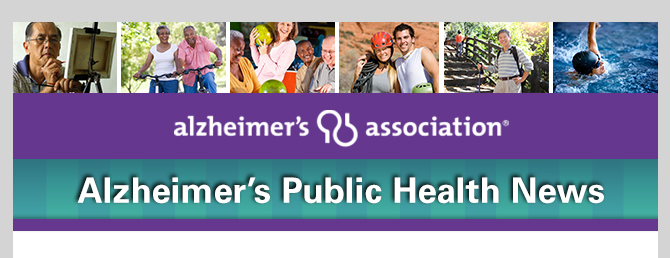


 Health care, long-term care, and caregiving costs during the final five years of life for people with dementia are 57 percent higher than for those without dementia, according to a new
Health care, long-term care, and caregiving costs during the final five years of life for people with dementia are 57 percent higher than for those without dementia, according to a new  Three new briefs
Three new briefs In case you missed The Value of Knowing: The Importance of Early Detection, last month’s
In case you missed The Value of Knowing: The Importance of Early Detection, last month’s  In addition to the webinar, new resources from the Alzheimer’s Association are available to help public health officials encourage early detection.
In addition to the webinar, new resources from the Alzheimer’s Association are available to help public health officials encourage early detection.